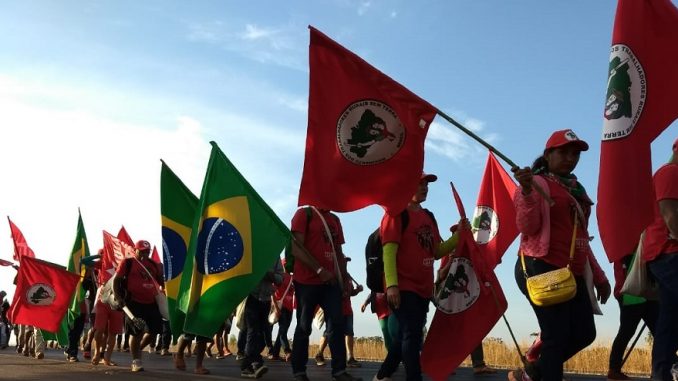
We reproduce an article by Marco Antonio de Moraes, comrade of the Centralidade do Trabalho current in Brazil, originally published on its web page on July 26.
By Marco Antonio de Moraes – Centralidade do Trabalho
In the last few days, the economic news have reported on the accession of cooperatives linked to the MST – Landless Movement to the capital market. This novelty, added to the increasingly scarce and reduced number of land distribution claims, reveals a reorientation of the movement’s priorities. The lowering of its objectives is clear, dictated by the conciliatory horizon of the periods of electoral ascendancy and of the PT government terms, with a governance linked to broad sectors of the bourgeoisie, including the agro-industrial sectors, and with interests in the continuity of the highly concentrated land ownership in Brazil.
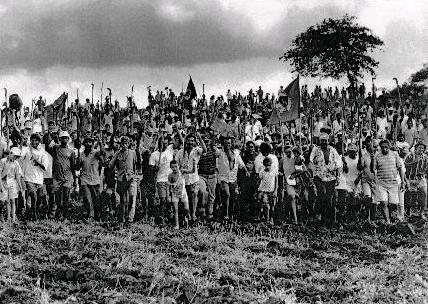
The MST, in its 1st Meeting, in 1984, in the city of Cascavel/PR, defined the objective of its formation as a national organization in the deliberation that gave rise to its intended identity:
“We want to be producers of food, culture and knowledge. And even more: we want to be builders of a socially just, democratic country, with equality and in harmony with nature”.
The movement, which in a certain way claims to be the heir of the Ligas Campesinas, was formed from the struggles for land in the aftermath of the military dictatorship, led by rural workers under the predominant influence of Catholic progressivism, especially the CPT – Pastoral Land Commission and the CEBs – Ecclesial Base Communities. In 1985, in Curitiba/PR, in its 1st Congress, the MST consolidated its formation, deliberating on the slogans of radical opposition to the landowners: “Land for those who work it” and “Occupation is the only solution”.
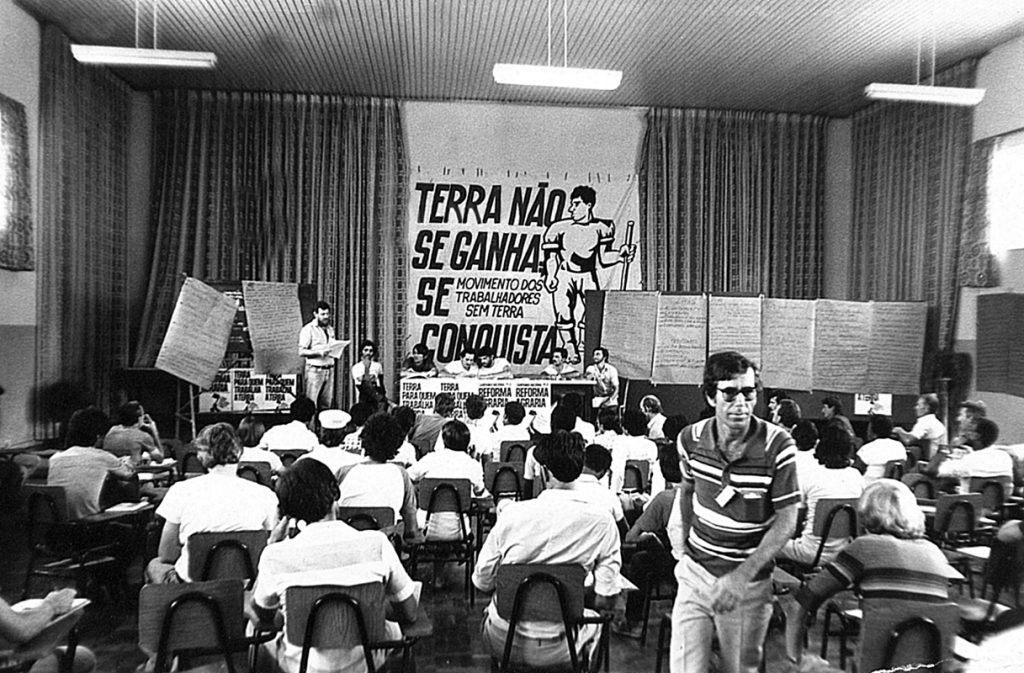
Although the two original banners of the MST did not aim at a radical break with capitalism, among other things because their limit was land ownership or land concessions that would lead to the constitution of small rural producers, the call for agrarian reform would battle land concentration. In a country with an economic profile that was initially colonial and slavery-based, and later underdeveloped, dependent and peripheral, as well as with a strong history of landowners and agribusiness, the agrarian reform would face one of the main marks of Brazil’s subordination in the global scenario of capitalism, as a predominant and permanent producer of agricultural and mineral raw materials.
It was as a result of the formation of the MST that landowners soon after organized themselves into the UDR – Rural Democratic Union. Initially formed in 1985, it was composed of farmers from the region afflicted by land conflicts, in the Pontal do Paranapanema, in the state of São Paulo. Based on the principle that the right to private land ownership prevails over the workers´ right to live in the struggle for land, in 1986, the UDR acquired national scope, defending the armed confrontation with the occupations organized by the MST.
The attacks on the movements for land have intensified, leaving death and violence for the rural workers and their leaders by the brutal action of the landowners and also by the repression of the structures of the Brazilian State. Such was the emblematic case of the Eldorado do Carajás/PA massacre, 25 years ago, when, during a march to demand the settlement of landless families, the military police of Pará attacked and killed 21 rural workers in defenseless conditions.
The movement has not cooled down even with the aggressions of the landowners, whether by violence in the countryside or by the strong political influence of the institutional environment of the executive and legislative powers (with the extensive ruralist caucus, always organized since the Constituent Assembly of 1987/1988), and the apparently deliberate lack of resolution of conflicts in the countryside through the judicial process.
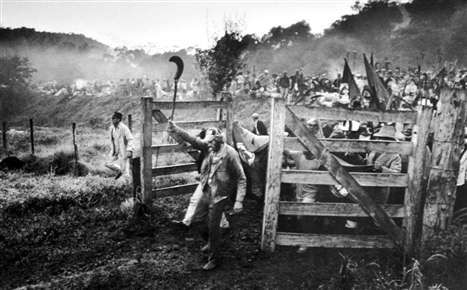
In the 1980s, 1990s and early 2000s, the struggles, occupations and marches of the MST showed great organizational capacity, which led many workers in urban centers, affected by economic crises, structural unemployment and lack of income prospects, to join the struggle for rural settlements, and inspired many activists and militants in the cities, especially young people.
In the mid-1990s, with numerous settlements won with their struggle, through persistent encampments (under “black tarpaulins”) on roadsides and in occupied areas, the MST began to seek the economic viability of these settlements, and strove for budgetary allocations and specific public funding. In this sense, the FHC government created the Ministry of Agrarian Development (MDA) in 1999, detaching the agrarian reform and family farming from the Ministry of Agriculture and opening the way for negotiations between the government and the movement.
It was also in the second half of the 1990s that the MST began to question not only the distribution of land, but also the agricultural and livestock production model associated with the concentration of land ownership. This model is oriented to supply the demand of the international market for raw materials.
The movement opposes the paradigm based on agricultural exports, defending food production by family farming, with agroecological methods, in direct conflict with the predominant technological panacea of the “Green Revolution”, with an intense use of pesticides, hybrid and transgenic seeds, and monocultures. This form of production is very profitable for the large chemical companies that produce pesticides and fertilizers, patented seeds, agricultural machinery and industrialized foods, and which, as a general rule, are companies embedded in oligopolies of giant transnational corporations.
With its leadership umbilically linked to the Workers’ Party (PT) during the Lula and Dilma governments, despite the drop in the number of new agrarian reform settlements, the priority given to funding and public policies benefiting agribusiness exporters, and the regularization of GMOs in the country through strange regulations, the mitigating and targeted policies of the PT government, such as the PAA – Family Farming Food Acquisition Plan, largely satisfy the movement. The organized struggle against the landowners, in practice, fades away as the main objective of the MST’s organization, becoming almost a mere rhetorical element of the organization.
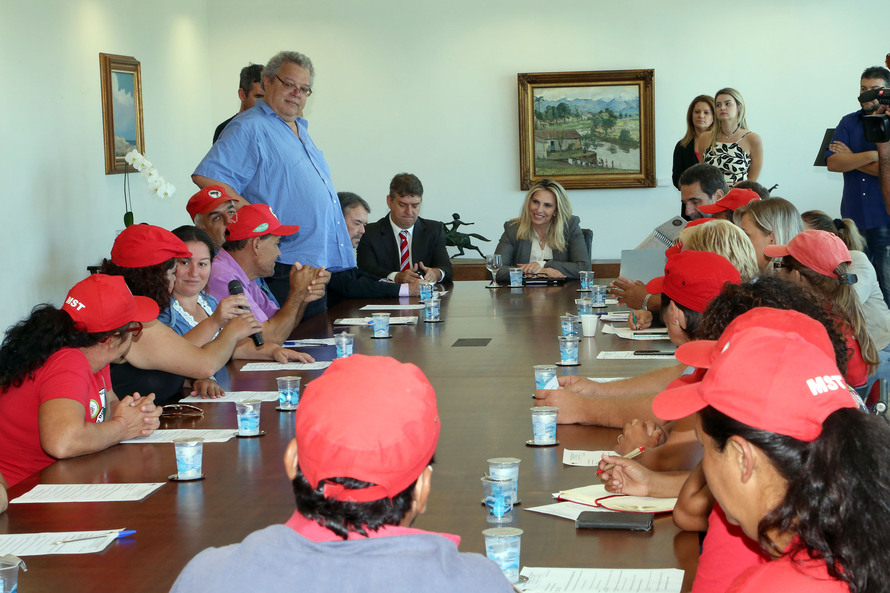
In contradiction with the original motivations of the MST, it should be noted that during the Lula and Dilma governments, the process of land concentration in Brazil advanced, even with the permissive reform of the Forestry Code. This enabled and regularized the unstoppable advance of the agricultural frontier over areas of cerrado and forests, in addition to creating situations in which there is no obligation to replenish the forest and compensation for accepting a situation that is considered consummated in the suppression of flora and, consequently, of native fauna. Data from the IBGE Agricultural Census of 2006 and 2017, which report a representative span of PT governments, show a leap in the total occupation of areas by rural establishments with more than 1,000 hectares, from 45.0% in 2006 to 47.6% in 2017. Another indication of land concentration and unbridled expansion of the agricultural frontier during the PT governments is the growth of 17.6 million hectares in the area occupied by rural establishments in the period between the two censuses, despite the fact that more than 102,000 rural establishments ceased to exist in the same period. Probably among the causes is the incorporation or aggregation of adjacent rural establishments, unifying them, thus reducing the number of owners or possessors, concentrating the domain or possession of the land.
More focused on the economic sustainability of already established settlements, the MST is investing in the institutional formalization with the creation of legal entities that enable commercial negotiations and government purchases. Today there are 160 cooperatives, 120 agroindustries and 1,900 settler associations (data source: mst.org.br). The option for the logic of the “solidarity economy” is clear, adapted to the so-called “market niches”, absolutely allowed in the liberal environment, since they lack any risk of effective mutability to the capitalist regime. Moreover, it satisfies the consumption of a small and increasingly minuscule part of the economically well-off population. The distinction that gives most value to the products of this niche is their labeling as socially and ecologically just production, which allows for a supposedly more virtuous consumption and an undemanding penance of conscience on the part of the aforementioned very small population. In a certain way, the frank criticism and confrontation with the technological model of agricultural and livestock production, centered on agro-exports and focused on extensive monocultures, also passes into the merely rhetorical sphere and, in practical action, by a significant moderation.
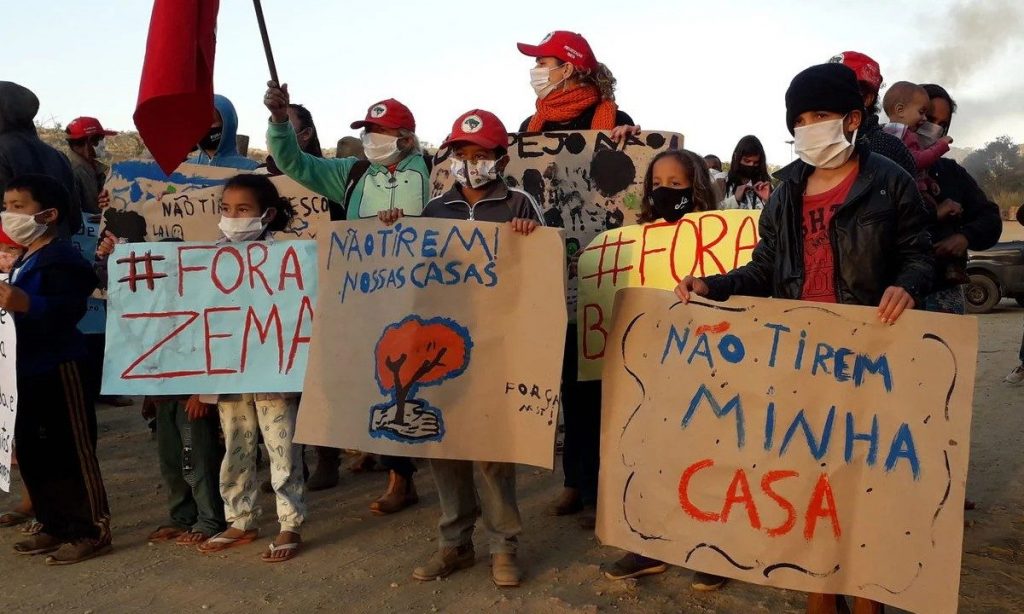
It is in this context that the recent news of the entry of the cooperatives linked to the MST into the capital market is not surprising, with the registration with the CVM – Securities Commission – of a fund that will be based on “Agribusiness Receipt Certificates”, a sort of “paper” of the market of futures of the crops and production of the cooperatives, with titles “that could even be traded in the secondary market of the São Paulo Stock Exchange, depending on their liquidity”, according to an article in the web “El País”.
The initiative is guided by the former banker and current investment consultant Eduardo Moreira, who preaches a “re-foundation” of capitalism, proposing the unrealizable transformation of an evidently insurmountable paradox, to make capitalism something humanized, “ethical” and “conscious”, according to his words in the reports on the subject, as if we had here a mere moral question to solve.
The cover story of the magazine “Exame”, in its article, presents a sort of counterpart to the capital market adventure: the abdication of the land occupations organized by the MST, as follows:
“Since last year, the MST has set aside land invasions to focus on production. The priority has been to sell food directly to consumers, through “agrarian reform fairs”, held in 15 cities in the country. Invasions had decreased since Dilma Rousseff’s government and practically ceased with the inauguration of Jair Bolsonaro, who threatened to classify the MST as a terrorist organization.
Regarding the aforementioned threat by Bolsonaro, it should be noted that the Anti-Terrorism Law (Federal Law 13.260/2016) was sanctioned during the government of Dilma Roussef, with the aim of preventing and repressing demonstrations on public roads, when the 2016 Rio de Janeiro Olympic Games were approaching, and opened an interpretation for the criminalization of protest movements, whether organized or spontaneous.
More clearly, since the time of the Petista governments, radical contestation and the MST’s fierce and bold confrontation with the landowners have been replaced by the attenuation of struggles and a path of accommodation with the “differentiated” production and market spaces granted to them.
The picture is indicative of the power of ideological co-optation of capital over those who organize and act in positions far from a revolutionary strategic horizon, therefore, without centrality in the class struggle and, finally, end up settling for absolutely insufficient mitigations for the burying of the Brazilian social abyss. This is the case of popular movements and trade union organizations that base their actions on progressive or left-wing liberalism, hegemonically represented in the domesticated Petismo, with effective capacity to influence the other proclaimed left-wing parties. In these cases, the perspectives are limited and one runs the risk of falling easy prey to the traps that lead actions, struggles, programs and radicalized objectives to a docile petty-bourgeois transmutation.
The resumption of the struggle for agrarian reform, prioritizing the struggle against the landowners, in confrontation with the capitalist private property of the Brazilian soil, is a fundamental step for the gains of the working class. In the same way, the appropriation by the workers of the technological advances, of the consequent productive capacity and of the rational and planned forms of production is necessary, so that they revert in benefits for the working class itself, in the countryside and in the city, beyond agricultural production at the mercy of the mandates of capital or simply of the demands of the international market. The organizational competence historically demonstrated by the MST and other movements in the struggle for land are emblematic of the fact that this necessary struggle is possible, in a persistent and determined manner, as long as it is associated with the objective of overcoming capitalism.








